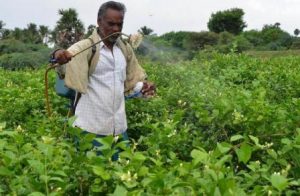India’s Floriculture Industry: Minors Exposed to Highly Hazardous Pesticides
The international community must work on a comprehensive binding treaty to regulate hazardous pesticides throughout their life cycle, taking into account human rights principles.
Rampant use of Highly Hazardous Pesticides (HHPs) in floriculture farms in Tamil Nadu is affecting Dalit children who work in these farms.The study,  entitled Toxic Blooms: Impacts of Pesticides in the Floriculture Industry in Tamil Nadu, India, showed that children are directly exposed to pesticides while picking flowers to help their families earn a living and pay for school expenses. It was conducted in Thiruvallur District, which is a top jasmine-producing area in Tamil Nadu.
entitled Toxic Blooms: Impacts of Pesticides in the Floriculture Industry in Tamil Nadu, India, showed that children are directly exposed to pesticides while picking flowers to help their families earn a living and pay for school expenses. It was conducted in Thiruvallur District, which is a top jasmine-producing area in Tamil Nadu.
The study was released by the Pesticide Action Network Asia Pacific (PANAP), Society for Rural Education and Development (SRED), and PAN India. The study was released in commemoration of the Bhopal Gas tragedy. December 3 also marks the beginning of the annual No Pesticide Use Week, a week-long campaign by PANAP and its partners across the region to call for the phase-out or ban of Highly Hazardous Pesticides (HHPs).
As per the study the health symptoms of poisoning experienced by children, aged 9 to 13, include headaches, skin rashes, vomiting, fatigue, sleeplessness, tremors, dizziness, fever, and body pain. One-third of all children respondents reported becoming ill weekly.
Out of the total 109 pesticide brands identified by the children, farmers, and shop retailers, 82 per cent contained HHPs. Out of the 44 HHPs identified in the study, 32 are already banned in one or more countries. Many of these pesticides have been proven to be highly toxic to bees, fatal if inhaled, likely carcinogenic, reproductive toxicants, endocrine disruptors, and very persistent in water and soil.
Also Read : FAO’s Collaboration with CropLife: Protests Deepening
Nine pesticides have been identified by PANAP as particularly toxic to children: cypermethrin, lambdacyhalothrin, chlorpyrifos, monocrotophos, paraquat, glyphosate, dichlorvos, mancozeb, and permethrin. Paraquat and chlorpyrifos are restricted and not authorised by the Central Insecticide Board and Registration Committee for use in flowers, yet were discovered to be used in floriculture farms where children work.
Leading manufacturers of the HHPs used in floriculture farms are both local and transnational agrochemical companies: Dhanuka Agritech, Syngenta, Bayer Crop Science, Dow AgroSciences, and Rallis India.
Limited Personal Protective Equipments (PPE) were found in retail shops. Only five pesticide products had instructions for use written in the local language.
“The ground reality of pesticide use in floriculture fields is in violation with both national regulations and international standards, and puts children in danger of exposure to toxic pesticides capable of triggering chronic health effects. Early this year, the Indian government had included some of the pesticides reported in this study in its draft ban order 2020. It was a good move, but it is not sure when this ban would come into effect,” said Dileep Kumar, assistant director of PAN India.
“We are in the 21st century and development in our part of the world is exploiting Dalit children working in floriculture farms, which is a clear violation of national and international child rights standards”, said Dr Fatima Burnad, executive director of SRED. Dr Burnad added that “Corporate profiteers are sucking up the blood of Dalit children. These agrochemical corporations are destroying the future of Dalit children with the damages caused by pesticides on their health and education. We condemn this corporate intrusion into our villages, our agriculture, and our country.”
Also Read : Industrial Agriculture is Creating Poison, Not Food: Say Agroecologists
According to PANAP, pesticide companies should also be held accountable for violations of the UN Convention on the Rights of the Child, such as the right to life, the right to education, and the right to enjoy the highest standard of health.
The study has suggested some recommendations, which are as follows:
- Implement programmes on the ground that tackle child labour and poverty, coupled with awareness raising on the negative effects of child labour and children’s exposure to pesticides, especially with families that grow flowers.
- Develop comprehensive national action plans that include incentives to support alternatives to hazardous pesticides, as well as initiate binding and measurable reduction targets with time limit.
- The international community must work on a comprehensive, binding treaty to regulate hazardous pesticides throughout their life cycle, taking into account human rights principles.
- Monitor corporations to ensure that labelling, safety precautions and training standards are respected.
“The Government of India has to come up with urgent measures to keep away all Highly Hazardous Pesticides in floriculture, and direct the agriculture extension mechanisms to come up with alternative non-chemical farming practices based on agroecology. Further, government need to take concerted efforts to update its policy and ensure effective implementation of regulations on child labour, so as to protect our children from working in unsafe conditions,” Kumar said.
With the US, the Netherlands, the United Kingdom, Germany, and United Arab Emirates as top export destinations for India’s growing floriculture industry, many small-holder farmers, landlords and corporations are switching to flower farming.
The Pesticide Action Network (PAN) is a network of over 600 participating non-governmental organizations, institutions and individuals in over 90 countries working to replace the use of hazardous pesticides with ecologically sound and socially just alternatives.PAN Asia Pacific (PANAP) is a PAN regional center based in Penang, Malaysia.
